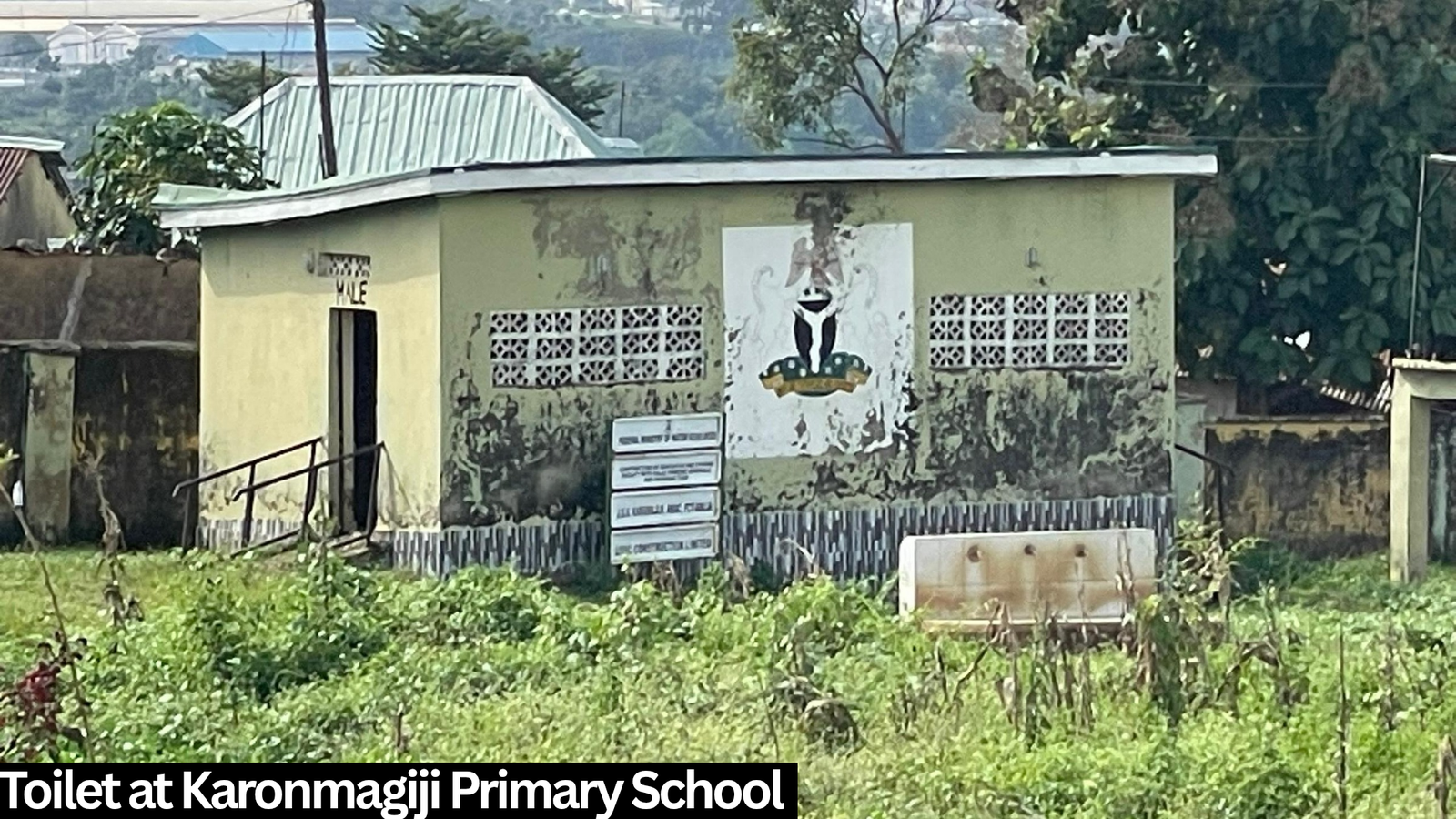
A doorless toilet at Karonmagiji Primary School, Airport Road, Abuja — a stark symbol of the sanitation crisis in FCT public schools.
ABUJA, Nigeria – At first glance, Abuja, Nigeria’s Federal Capital Territory (FCT), projects modernity — broad highways, manicured boulevards, and gleaming government complexes. Yet behind this polished image lies a silent emergency unfolding in its public schools: a worsening sanitation crisis that erodes children’s health, dignity, and right to learn. In this report, Chukwu Obinna uncovers how inadequate toilets in Abuja’s public schools are deepening inequality, undermining education, and threatening children’s health.
The Morning Dilemma
Every school day, 14-year-old Blessing Okoro faces an impossible choice at Government Secondary School, Karonmagiji, located along the Airport Road corridor near the Military Cemetery junction.
“Sometimes I don’t drink water all day, so I won’t need to use the toilet,” she confides, her voice quiet but firm. “The toilets are dirty, they smell terrible, and there are only three working ones for all the girls. You can spend your whole break just waiting.”
Blessing’s ordeal mirrors a widespread problem across FCT’s public schools: too few toilets, too little maintenance, and too much neglect.
Africa Health Report, (AHR) findings across schools in Karonmagiji and Kuchigoro communities found a sanitation system on the brink of collapse — one that threatens students’ physical and mental wellbeing and reinforces structural inequities in Nigeria’s education system.
Two Realities, One Capital
While Abuja’s city centre gleams with public investment, its school compounds tell another story. In Karonmagiji, 16-year-old Emmanuel Adamu describes the struggle.
“We have about 1,200 students but only two toilets that work,” he says. “During break, students rush out to nearby bushes or houses because the toilets are full or broken.”
The World Health Organisation (WHO) recommends one toilet for every 25 students — but in both schools visited, the ratio exceeded 1:200, with some facilities serving over 300 pupils per unit.
This gap, experts say, exposes children to preventable diseases and undermines learning outcomes.
The Hidden Health Toll
“When children avoid toilets or hold urine for long periods, they risk urinary infections, constipation, and kidney problems,” explains Dr. Ngozi Okafor, a public health physician at Abakaliki Teaching Hospital. “For adolescent girls, poor menstrual hygiene can lead to infections and prolonged school absenteeism.”
WaterAid Nigeria’s 2023 report found that girls miss an average of five school days per month due to poor sanitation. Over time, that means lower performance and higher dropout rates.
Blessing admits this happens often:
“When I’m on my period, I sometimes stay home because there’s nowhere private to change or throw away pads,” she says.
The stigma can be crushing. Emmanuel recalls a classmate who had an accident because all toilets were occupied. “Everyone laughed,” he says quietly. “He stopped coming to school for almost two months.”
Infrastructure and Neglect
According to teachers, the problem is systemic — rooted in poor infrastructure and chronic underfunding.
“We submit requests for toilet rehabilitation every budget cycle, but funds rarely come,” says Mr. Tunde Akinola (name changed), a teacher at the Karonmagiji school. “Facilities were built for far fewer students than we have today. Maintenance is left to us.”
In Kuchigoro Primary School, built for 400 pupils but now hosting over 900, broken toilets, vandalism, and lack of running water make hygiene nearly impossible. Many schools rely on water tankers that arrive irregularly, worsening conditions during dry months.
A Gendered Crisis
For girls, sanitation is not just about comfort — it’s about dignity and safety.
“Sometimes the doors don’t lock or there’s no door at all,” Blessing says. “You have to get a friend to stand guard.”
A UNICEF 2024 report shows that schools without gender-segregated toilets face higher female dropout rates once girls reach puberty.
A gender and development specialist, Mrs. Amina Bello, explains: “Toilet access is a gender equity issue. When girls don’t have safe, private, and hygienic facilities, they’re effectively being denied education.”
While most schools visited had separate toilet blocks, many lacked privacy features such as locks, lighting, or enclosed pathways. For young girls, these details mean the difference between attending class and staying home.
Learning Interrupted
Teachers see the impact daily.
“Students who need the toilet but can’t go are distracted and uncomfortable,” says Mrs. Chioma, a teacher in Kuchigoro. “They lose focus and often perform poorly.”
Emmanuel recalls missing exam questions because he couldn’t concentrate:
“I failed a mathematics test because I spent the whole time trying to hold it in. I just couldn’t think straight.”
Studies by the African Population and Health Research Center (2022) link adequate school sanitation with higher attendance and academic achievement — proof that toilets are not a luxury, but a learning tool.
A National Mirror
The sanitation crisis in FCT schools mirrors a national emergency. According to UNICEF (2024), about 48 million Nigerians still practice open defecation — the highest in Africa after India.
Only 34 per cent of public schools’ nationwide meet WHO sanitation standards; in the FCT, the figure rises slightly to 41 percent — still leaving most students without safe toilets.
The World Bank (2021) estimates that poor sanitation costs Nigeria ₦455 billion annually in health expenses, lost productivity, and premature deaths. “Schools with inadequate toilets are breeding grounds for cholera, typhoid, and dysentery,” Dr. Okafor warns. “It’s a public health failure.”
Solutions Within Reach
Experts argue that fixing school sanitation is possible — with will and coordination.
“Public-private partnerships can help,” says Mrs. Bello. “Companies can adopt schools and upgrade facilities as part of corporate social responsibility.”
The federal “Clean Nigeria: Use the Toilet” campaign, aimed at ending open defecation by 2030, could be expanded to target schools specifically, with measurable targets and timelines.
Advocates also urge the FCT Administration to:
Conduct a sanitation audit across all schools.
Prioritise emergency rehabilitation of non-functional toilets.
Enforce gender-responsive design.
Establish parent–teacher maintenance committees.
And integrate sanitation into school health programmes.
Breaking the Silence
School toilets rarely make headlines. Yet they reveal more about national priorities than skyscrapers or flyovers.
“Sanitation is healthcare,” Dr. Okafor says. “When we fail to provide safe toilets in schools, we fail to protect children.”
Blessing dreams of a simple dignity:
“I just want to go to school and not worry about where I’ll use the toilet or get sick,” she says. “Is that too much to ask?”
Until her question is answered, Abuja’s modern image remains incomplete — a capital city whose children still learn without dignity.




